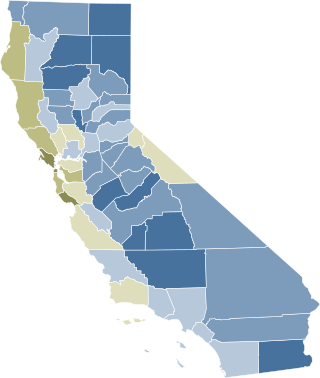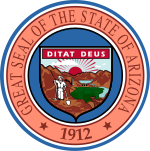The Federal Marriage Amendment (FMA), also referred to by proponents as the Marriage Protection Amendment, was a proposed amendment to the United States Constitution that would legally define marriage as a union of one man and one woman. The FMA would also prevent judicial extension of marriage rights to same-sex couples.

Proposition 22 was a law enacted by California voters in March 2000 stating that marriage was between one man and one woman. In November 2008, Proposition 8 was also passed by voters, again only allowing marriage between one man and one woman. The Act was proposed by means of the initiative process. It was authored by state Senator William "Pete" Knight and is known informally as the Knight initiative. Voters adopted the measure on March 7, 2000, with 61% in favor to 39% against. The margin of victory surprised many, since a Field Poll immediately prior to the election estimated support at 53%, with 40% against and 7% undecided.
Same-sex marriage has been legal in California since June 28, 2013. The State of California first issued marriage licenses to same-sex couples from June 16, 2008 to November 5, 2008, a period of approximately 4 months, 2 weeks and 6 days, as a result of the Supreme Court of California finding in the case of In re Marriage Cases that barring same-sex couples from marriage violated the Constitution of California. The issuance of such licenses was halted from November 5, 2008 through June 27, 2013 due to the passage of Proposition 8—a state constitutional amendment barring same-sex marriages. The granting of same-sex marriages recommenced following the U.S. Supreme Court's decision in Hollingsworth v. Perry, which restored the effect of a federal district court ruling that overturned Proposition 8 as unconstitutional.

Prior to the Supreme Court's decision in Obergefell v. Hodges (2015), U.S. state constitutional amendments banning same-sex unions of several different types passed, banning legal recognition of same-sex unions in U.S. state constitutions, referred to by proponents as "defense of marriage amendments" or "marriage protection amendments." These state amendments are different from the proposed Federal Marriage Amendment, which would ban same-sex marriage in every U.S. state, and Section 2 of the Defense of Marriage Act, more commonly known as DOMA, which allowed the states not to recognize same-sex marriages from other states. The amendments define marriage as a union between one man and one woman and prevent civil unions or same-sex marriages from being legalized, though some of the amendments bar only the latter. The Obergefell decision in June 2015 invalidated these state constitutional amendments insofar as they prevented same-sex couples from marrying, even though the actual text of these amendments remain written into the state constitutions.

Ballot Measure 2 of 1998 is a ballot measure, since ruled unconstitutional, that added an amendment to the Alaska Constitution that prohibited the recognition of same-sex marriage in Alaska. The Ballot measure was sparked by the lawsuit filed by Jay Brause and Gene Dugan, after the two men were denied a marriage license by the Alaska Bureau of Vital Statistics. In Brause v. Bureau of Vital Statistics, 1998 WL 88743, the Alaska Superior Court ruled that the state needed compelling reason to deny marriage licenses to same-sex couples and ordered a trial on the question. In response, the Alaska Legislature immediately proposed and passed Resolution 42, which became what is now known as Ballot Measure 2. Ballot Measure 2 passed via public referendum on November 3, 1998, with 68% of voters supporting and 32% opposing. The Bause case was dismissed following the passage of the ballot measure.

Wisconsin Referendum 1 of 2006 was a referendum on an amendment to the Wisconsin Constitution that would invalidate same-sex marriages or any substantially similar legal status. The referendum was approved by 59% of voters during the general elections in November 2006. All counties in the state voted for the amendment except Dane County, which opposed it. The constitutional amendment created by Referendum 1 has been effectively nullified since June 26, 2015, when the United States Supreme Court ruled in Obergefell v. Hodges that state-level bans on same-sex marriage are unconstitutional.

Proposition 2 was a referendum for a state constitutional amendment placed on the ballot by the Texas legislature and approved by the voters at the November 8, 2005 general election. The measure added a new provision to the Texas Constitution, Article 1, Section 32, which provides that "Marriage in this state shall consist only of the union of one man and one woman", and "This state or a political subdivision of this state may not create or recognize any legal status identical or similar to marriage." Thus Texas became the 19th US state to adopt constitutional amendment banning same-sex marriage. It was the most populous state to adopt a constitutional ban on same-sex marriage until California passed its ban in November 2008. The amendment was later invalidated in June 2015 after the Supreme Court legalized same-sex marriage nationwide in the Obergefell v. Hodges decision, though the amendment remains in the Texas Constitution.

Nebraska Initiative 416, officially titled "Ban Same-Sex Marriage Act", was a 2000 ballot initiative that amended the Nebraska Constitution to make it unconstitutional for the state to recognize or perform same-sex marriage, same-sex civil unions or domestic partnerships. The referendum was approved on November 7, 2000, by 70% of the voters. The initiative has since been struck down in federal court and same-sex marriage is now legally recognized in the state of Nebraska.

Constitutional Amendment 3 of 2004, is an amendment to the Arkansas Constitution that makes it unconstitutional for the state to recognize or perform same-sex marriages or civil unions. The referendum was approved by 75% of the voters.

Georgia Constitutional Amendment 1 of 2004, is an amendment to the Georgia Constitution that previously made it unconstitutional for the state to recognize or perform same-sex marriages or civil unions. The referendum was approved by 76% of the voters.

Proposition 8, known informally as Prop 8, was a California ballot proposition and a state constitutional amendment intended to ban same-sex marriage; it passed in the November 2008 California state elections and was later overturned in court. The proposition was created by opponents of same-sex marriage in advance of the California Supreme Court's May 2008 appeal ruling, In re Marriage Cases, which followed the short-lived 2004 same-sex weddings controversy and found the previous ban on same-sex marriage unconstitutional. Proposition 8 was ultimately ruled unconstitutional by a federal court in 2010, although the court decision did not go into effect until June 26, 2013, following the conclusion of proponents' appeals.

The California state elections, November 2008 were held on November 4, 2008 throughout California. Among the elections taking place were those for the office of President of the United States, all the seats of California's delegation to the House of Representatives, all of the seats of the State Assembly, and all of the odd-numbered seats of the State Senate. Twelve propositions also appeared on the ballot. Numerous local elections also took place throughout the state.

Arizona Proposition 102 was an amendment to the constitution of the U.S. state of Arizona adopted by a ballot measure held in 2008. It added Article 30 of the Arizona Constitution, which says: "Only a union of one man and one woman shall be valid or recognized as a marriage in this state." The amendment added a constitutional ban on same-sex marriage to existing statutory bans in place since 1996. In October 2014, Article 30 of the Arizona Constitution was struck down as unconstitutional in the United States District Court for the District of Arizona, and is no longer enforced by the state of Arizona, which now allows and recognizes same-sex marriages.

Florida Amendment 2 is an amendment made to the constitution of the U.S. state of Florida in 2008. It added Article I, Section 27 to the constitution, which defines marriage as a union only between one man and one woman, and thus bans the creation of similar unions, such as civil unions or same-sex marriage. Since 2014, the measure was litigated in court and was struck down by multiple state courts in several counties of southern Florida. Same-sex marriage became legal in Florida when the decision in the federal case Brenner v. Scott found the amendments banning same-sex marriage to be unconstitutional.
Strauss v. Horton, 46 Cal. 4th 364, 93 Cal. Rptr. 3d 591, 207 P.3d 48 (2009), was a decision of the Supreme Court of California, the state's highest court. It resulted from lawsuits that challenged the voters' adoption of Proposition 8 on November 4, 2008, which amended the Constitution of California to outlaw same-sex marriage. Several gay couples and governmental entities filed the lawsuits in California state trial courts. The Supreme Court of California agreed to hear appeals in three of the cases and consolidated them so they would be considered and decided. The supreme court heard oral argument in the cases in San Francisco on March 5, 2009. Justice Kathryn Mickle Werdegar stated that the cases will set precedent in California because "no previous case had presented the question of whether [a ballot] initiative could be used to take away fundamental rights".
Same-sex marriage has been legal in Arizona since October 17, 2014. The U.S. state had denied marriage rights to same-sex couples by statute since 1996 and by an amendment to its State Constitution approved by voters in 2008. On October 17, Judge John W. Sedwick ruled in two lawsuits that Arizona's ban on same-sex marriage was unconstitutional, and enjoined the state from enforcing its ban, effective immediately. Attorney General Tom Horne said the state would not appeal that ruling, and instructed county clerks to comply and issue marriage licenses to same-sex couples.

North Carolina Amendment 1 is a partially overturned legislatively referred constitutional amendment in North Carolina that amended the Constitution of North Carolina to add ARTICLE XIV, Section 6, which prohibit the state from recognizing or performing same-sex marriages, civil unions or civil union equivalents by defining male–female marriage as "the only domestic legal union" considered valid or recognized in the state. It did not prohibit domestic partnerships in the state and also constitutionally protected same-sex and opposite-sex prenuptial agreements, which is the only part that is still in effect today. On May 8, 2012, North Carolina voters approved the amendment, 61% to 39%, with a voter turnout of 35%. On May 23, 2012, the amendment took effect.

The 2006 Virginia State Elections took place on Election Day, November 7, 2006, the same day as the U.S. House and the U.S. Senate elections in the state. The only statewide elections on the ballot were three constitutional referendums to amend the Virginia State Constitution. Because Virginia state elections are held on off-years, no statewide officers or state legislative elections were held. All referendums were referred to the voters by the Virginia General Assembly.

Proposition 3, titled Constitutional Right to Marry, was a California ballot proposition and legislative statutes that passed by vote on in the 2024 general election on November 5, 2024. The proposition repealed Proposition 8 passed during the 2008 general election and amend the state constitution to declare that the "right to marry is a fundamental right". It also ensured that same-sex couples would have the right to marry in California in case the United States Supreme Court ever withdraws that federal right.
















